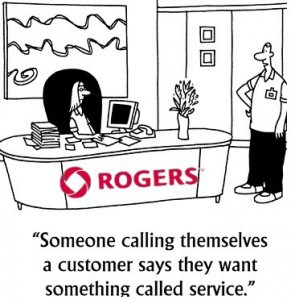Some Rogers Cable customers are being notified the cable company is slimming down their analog television lineup, requiring customers to get a digital adapter to continue watching networks in their new digital format.

We’re enhancing our cable TV network to deliver on our commitment to provide you with quality in television viewing, programming and entertainment content. The Rogers Cable Network Enhancement initiative involves upgrading current analog channels to digital channels in order to provide a superior TV experience on our Rogers cable TV network.
To maintain your cable service, you may need to install a digital adapter.
Rogers says the change is designed to improve the video and sound quality of cable channels, but in reality most cable operators are shifting away from analog television to free up bandwidth that can be repurposed for more HD television channels or faster broadband service.
“The Digital Adapter is being provided to you free of charge, you will not be charged for the digital adapter or incur any service fees associated with the hardware,” says Rogers. “The Digital Adapter is being provided to you to use while you subscribe to Rogers cable television services and remains our property. The Digital Adapter must be returned to us upon termination of your Rogers cable television service.”
However, do-it-yourself types who spliced Rogers’ cable wiring themselves to add additional cable TV outlets in the home will discover “a catch.” These extra, informal cable outlets are allowed by Rogers, but the cable company will not supply digital adapters for televisions attached to them unless the subscriber formally signs up for Rogers’ “extra outlets” add-on. That does not come cheap. Rogers charges $6.99 per month for up to four extra televisions. If customers don’t sign up, those televisions without digital adapters will lose more than a dozen analog TV channels during the first wave of digital conversion. If a customer has more than four televisions hooked up to Rogers Cable, there may be more fees.
The channels Rogers is converting to digital were not selected to minimize viewer disruptions.
While The Shopping Channel secures a safe new analog channel number in St. John’s, N.B., Turner Classic Movies gets hit with a digital switch. Little watched APTN – The Aboriginal People’s Television Network survives on analog, AMC and CNN do not in Moncton. Toronto subscribers will lose 19 channels to digital, including MTV, BNN, and The Comedy Network. Two home shopping networks get to stay in analog, however.


 Subscribe
Subscribe With snow on the ground in parts of southern Ontario this morning, seeing beautiful beaches and bathing suits on Grand Cayman, Puerto Plata, Holguin and St. Maarten isn’t necessarily a bad thing. Devoting a cable channel to covering one Canadian airline’s ground crews might be.
With snow on the ground in parts of southern Ontario this morning, seeing beautiful beaches and bathing suits on Grand Cayman, Puerto Plata, Holguin and St. Maarten isn’t necessarily a bad thing. Devoting a cable channel to covering one Canadian airline’s ground crews might be. “This is an amazing opportunity to pull back the curtain and show people what we do and how we do it,” said David Soyka, WestJet’s director of marketing. “We’re looking forward to taking viewers behind the scenes at our airports as well as to some of our most spectacular destinations, without ever having to leave the comfort of their couch. We’re always in the air — and now we’re on the air, too.”
“This is an amazing opportunity to pull back the curtain and show people what we do and how we do it,” said David Soyka, WestJet’s director of marketing. “We’re looking forward to taking viewers behind the scenes at our airports as well as to some of our most spectacular destinations, without ever having to leave the comfort of their couch. We’re always in the air — and now we’re on the air, too.”
 Who needs 5-Hour Energy when you can watch that.
Who needs 5-Hour Energy when you can watch that.

 Rogers Cable has also suffered subscriber losses in Ontario from increasing competition from Bell’s IPTV service Fibe, which continues to run aggressive new customer promotions.
Rogers Cable has also suffered subscriber losses in Ontario from increasing competition from Bell’s IPTV service Fibe, which continues to run aggressive new customer promotions. Executives at Canada’s largest telecom companies are sighing relief after Verizon announced it was not interested in competing in Canada.
Executives at Canada’s largest telecom companies are sighing relief after Verizon announced it was not interested in competing in Canada.

